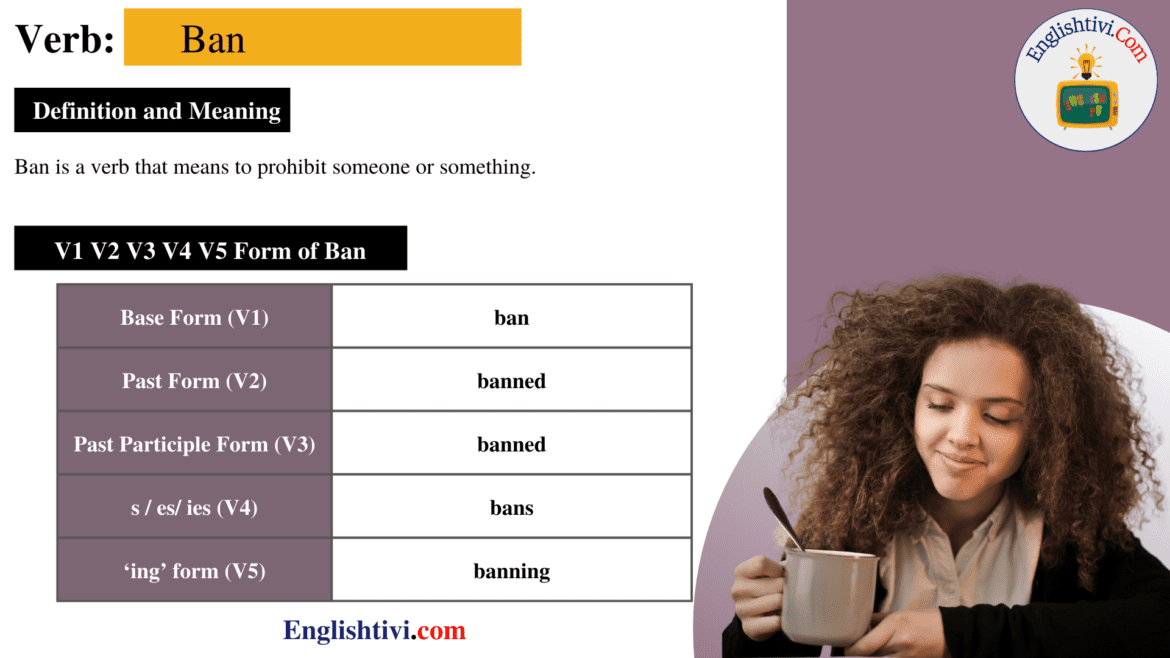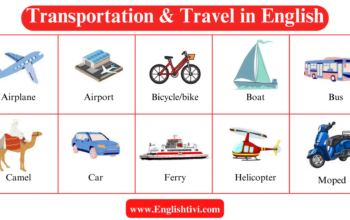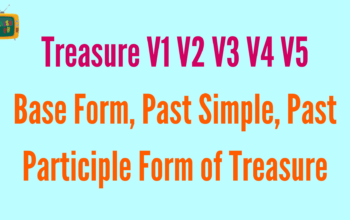Ban V1 V2 V3 V4 V5 is one of the verbs that are used very commonly in English tests as well as in everyday communication. Also, because it’s an irregular verb, ban doesn’t follow the regular rule. The verb “ban” has five different forms: base form, past simple, past participle form, present perfect, and present perfect participle. So what is ban‘s past? How do conjugate verbs with ban verbs?
⏩ Sign Up to Get Bonus
Let’s find out with English tivi in the article below.
See more at: Verbs
Ban of Definition and Meaning
Ban is a verb that means to prohibit someone or something.
V1 V2 V3 V4 V5 Form of Ban
| Base Form (V1) | ban |
| Past Form (V2) | banned |
| Past Participle Form (V3) | banned |
| s / es/ es (V4) | bans |
| ‘ing’ form (V5) | banning |
Ban of Past Simple V2
The verb Ban is also employed in its V2 form as “banned”’. It is used to indicate the past tense in sentences.
Ban of Past Participle V3
The V3 form is identical to the V2 form. The V3 form is “banned”. banned is used in the past or present perfect tense.
+ In the present perfect tense, the word ban is used ‘have +’banned ’ or ‘has +’banned.’
- I, you, and we are used as ‘have + ‘banned‘ subjects.
- He, she, and it are used as ‘has +’banned‘ subjects.
+ If you need to use the past perfect tense, use ‘had +’banned‘ regardless of the subject.
You might also like: ALL the English Grammar Basics You Need
Conjugation of Ban V1 V2 V3 V4 V5
| Conjugation table: Ban | |||
| Number | Singular | ||
| Present Simple of ban | I | You | She/He/It |
| ban | ban | bans | |
| Plural | |||
| We | You | They | |
| ban | ban | ban | |
| Present Continuous of ban | I | You | She/He/It |
| am banning | are banning | is banning | |
| Plural | |||
| We | You | They | |
| are banning | are banning | are banning | |
| Present Perfect of ban | I | You | She/He/It |
| have banned | have banned | has banned | |
| Plural | |||
| We | You | They | |
| have banned | have banned | have banned | |
| Present Perfect Continuous of ban | I | You | She/He/It |
| have been banning | have been banning | has been banning | |
| Plural | |||
| We | You | They | |
| have been banning | have been banning | have been banning | |
| Past Simple of ban | I | You | She/He/It |
| banned | banned | banned | |
| Plural | |||
| We | You | They | |
| banned | banned | banned | |
| Past Continuous of ban | I | You | She/He/It |
| was banning | were banning | was banning | |
| Plural | |||
| We | You | They | |
| were banning | were banning | were banning | |
| Past Perfect of ban | I | You | She/He/It |
| had banned | had banned | had banned | |
| Plural | |||
| We | You | They | |
| had banned | had banned | had banned | |
| Past Perfect Continuous of ban | I | You | She/He/It |
| had been banning | had been banning | had been banning | |
| Plural | |||
| We | You | They | |
| had been banning | had been banning | had been banning | |
| Future Simple of ban | I | You | She/He/It |
| will/shall ban | will/shall ban | will/shall ban | |
| Plural | |||
| We | You | They | |
| will/shall ban | will/shall ban | will/shall ban | |
| Future Continuous of ban | I | You | She/He/It |
| will/shall be banning | will/shall be banning | will/shall be banning | |
| Plural | |||
| We | You | They | |
| will/shall be banning | will/shall be banning | will/shall be banning | |
| Future Perfect of ban | I | You | She/He/It |
| will/shall have banned | will/shall have banned | will/shall have banned | |
| Plural | |||
| We | You | They | |
| will/shall have banned | will/shall have banned | will/shall have banned | |
| Future Perfect Continuous of ban | I | You | She/He/It |
| will/shall have been banning | will/shall have been banning | will/shall have been banning | |
| Plural | |||
| We | You | They | |
| will/shall have been banning | will/shall have been banning | will/shall have been banning | |
| Conditional Present of ban | I | You | She/He/It |
| would ban | would ban | would ban | |
| Plural | |||
| We | You | They | |
| would ban | would ban | would ban | |
| Conditional Perfect of ban | I | You | She/He/It |
| would have banned | would have banned | would have banned | |
| Plural | |||
| We | You | They | |
| would have banned | would have banned | would have banned | |
| Conditional Present Continuous of ban | I | You | She/He/It |
| would be banning | would be banning | would be banning | |
| Plural | |||
| We | You | They | |
| would be banning | would be banning | would be banning | |
| Conditional Perfect Continuous of ban | I | You | She/He/It |
| would have been banning | would have been banning | would have been banning | |
| Plural | |||
| We | You | They | |
| would have been banning | would have been banning | would have been banning | |
| Present Subjunctive of ban | I | You | She/He/It |
| ban | ban | ban | |
| Plural | |||
| We | You | They | |
| ban | ban | ban | |
| Past Subjunctive of ban | I | You | She/He/It |
| banned | banned | banned | |
| Plural | |||
| We | You | They | |
| banned | banned | banned | |
| Past Perfect Subjunctive of ban | I | You | She/He/It |
| had banned | had banned | had banned | |
| Plural | |||
| We | You | They | |
| had banned | had banned | had banned | |
| Imperative of ban | I | You | She/He/It |
| ban | |||
| Plural | |||
| We | You | They | |
| Let’s ban | ban | ||
See more at: Vocabulary
Example Sentences with Ban V1 V2 V3 V4 V5
In this section, we will learn about ban sentence examples:
+They are banned from the library.
+ The teacher tries to ban me.
+ We can ban the use of real weapons.
+ Outside food is banned in the cinema.
+ The government ban the new items.
Synonym Words For Ban
Synonym of ban word list. Here are a variety of words whose meaning is nearly the synonym of ban:
- exclude
- bar
- debar
- eliminate
- except
- shut out
- rule out
- close out
- count out
- freeze out
- prohibit from entering reject
Opposite Words For Ban
The antonym of ban word list. Here are some words that have nearly the opposite meaning as ban:
- admit
- include
- allow
- accept
- permit
- welcome
- approve
- sanction
- keep
- let in
- take in
You might also like: Best List of Irregular Verbs in English
Some Frequently Asked Questions About Ban (Verb)
What is the V1 V2 V3 V4 V5 of ban?
The past tense of ban is banned. The third-person singular simple present indicative form of ban is bans. The present participle of ban is banning. The past participle of ban is banned.
| Base Form (V1) | ban |
| Past Form (V2) | banned |
| Past Participle Form (V3) | banned |
| s / es/ ies (V4) | bans |
| ‘ing’ form (V5) | banning |
What is the V2 and V3 form of ban?
+ The V2 and V3 form of ban is “banned“.
What is the sentence of ban?
What is the past tense V2 of ban?
+ The past tense of ban is “banned“.
What is the past participle V3 of ban?
+ The past participle of ban is “banned“.
What is the present participle V5 of ban?
+ The present participle of ban is “banning“.
Conclusion
Let’s learn with English TV the structure of the verb “Ban V1 V2 V3 V4 V5“: Base Form, Past Simple, Present Continuous and Present Continuous and Present Continuous and Present Continuous forms. We wish you all the best of luck.
You should subscribe to the English TV YouTube channel if you want to learn more about the English language and improve your proficiency.





